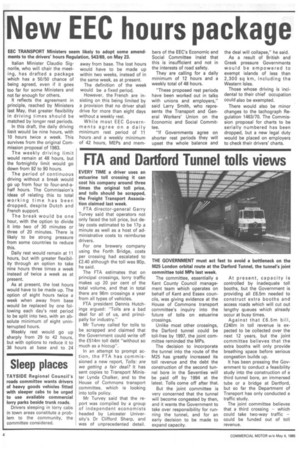FTA and Dartford Tunnel tolls views
Page 6

If you've noticed an error in this article please click here to report it so we can fix it.
EVERY TIME a driver uses an estuarine toll crossing it can cost his company around three times the original toll price, and tolls should be scrapped, the Freight Transport Association claimed last week.
FTA director-general Garry Turvey said that operators not only faced the toll price, but delay costs estimated to be 17p a minute as well as a host of administrative costs to reimburse drivers.
For one brewery company using the Forth Bridge, costs per crossing had escalated to £2.40 although the toll was 80p, he said.
The FTA estimates that on principal crossings, lorry traffic makes up 20 per cent of the total volume, and that in total there are 96m crossings a year from all types of vehicles.
FTA president Dennis Hutchings argued: "Tolls are a bad deal for all of us, and principally for industry."
Mr Turvey called for tolls to be scrapped and claimed that the Government could write off the £514m toll debt "without so much as a hiccup".
In an attempt to prompt action, the FTA has commissioned a new report, Tolls: are we getting a fair deal? It has sent copies to Transport Minister Lynda Chalker, and to the House of Commons transport committee, which is looking into tolls policy.
Mr Turvey said that the report was compiled by a group of independent economists headed by Leicester University's Dr Clifford Sharp, and was of unprecedented detail. The committee, essentially a Kent County Council management team which operates on behalf of Kent and Essex councils, was giving evidence at the House of Commons transport committee's inquiry into the future of tolls on estuarine crossings.
Unlike most other crossings, the Darford tunnel could be toll-free by 1997, the joint committee reminded the MPs.
The decision to incorporate the tunnel into the route of the M25 has greatly increased its toll revenue and the debt the construction of the second tunnel bore in the Seventies will be paid off by 1994 at the latest. Tolls come off after that.
But the joint committee is very concerned that the tunnel will become congested by then, and it wants the Government to take over responsibility for running the tunnel, and for an early decision to be made to expand capacity. At present, capacity is controlled by inadequate toll booths, but the Government is providing all £6.5m needed to construct extra booths and access roads which will cut out lengthy queues which already occur at busy times.
Against that £6.5m bill, £240m in toll revenue is expected to be collected over the next 12 years, but the joint committee believes that the extra booths will only provide breathing space before serious congestion builds up.
It has been pressing the Government to conduct a feasibility study into the construction of a third tunnel bore, an immersed tube or a bridge at Dartford, but so far the Department of Transport has only conducted a traffic study.
The joint committee believes that a third crossing — which could take two-way traffic — could be funded out of toll revenue.




































































































